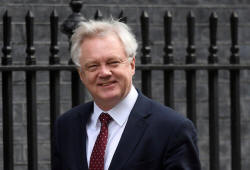|
UK can't quantify impact
of leaving EU without trade deal: Brexit minister
 Send a link to a friend
Send a link to a friend
 [March 15, 2017]
By Kylie MacLellan and William James [March 15, 2017]
By Kylie MacLellan and William James
LONDON
(Reuters) - The British government has not carried out an assessment of
what effect leaving the European Union without a new trade deal would
have on the economy, Brexit minister David Davis said on Wednesday.
Prime Minister Theresa May, who is due to begin the formal exit process
this month, has said she is prepared to walk away from negotiations with
the EU without a deal if she is dissatisfied with the terms on offer.
In the absence of an agreement, trade between Britain and the other 27
EU members would default to World Trade Organization rules and tariffs,
in contrast with the free access the UK has enjoyed as a member of the
EU's single market.
Some proponents of a so-called 'hard Brexit' are relaxed about that
scenario, while critics see it as potentially disastrous for the
economy.
Davis said he did not think that leaving with no deal would be as good
an outcome as the free trade agreement Britain is seeking with the bloc,
but he agreed with May it could be better than a bad deal.
"I canít quantify it for you in detail yet. I may well be able to do so
in about a yearís time. It is certainly the case that it is not as
frightening frankly as some people think," he said.

"You donít have to have a piece of paper with a number on it to have an
economic assessment. I spent ... most of my working life before coming
into politics dealing with business. You often knew what was a good deal
even though you didnít have the numbers."
He told a parliamentary committee hearing the last available analysis on
the 'no deal' scenario dated back to the campaign for the 2016
referendum in which Britons voted to leave the EU.
"One of the issues that's arisen is that those forecasts don't appear to
have been very robust," said Davis, who became a minister in July after
the vote.
Pressed whether any work had been done since then, he said: "If you mean
under my time, no."
[to top of second column] |

Britain's Brexit Secretary David Davies walks along Downing Street
in London, Britain, March 7, 2017. REUTERS/Toby Melville/File Photo

Davis said this was because there were too many variables and
uncertainties involved, including in areas such as customs procedures.
"Until we have worked out all the mitigation procedures we could not
quantify the outcome," he said.
Davis said he expected legislation giving May the power to trigger
Article 50 of the EU's Lisbon Treaty, launching divorce talks, would be
formally approved by Queen Elizabeth on Thursday.
The opposition Labour Party's Brexit spokesman Keir Starmer said the
government was "recklessly talking up the idea of crashing out of the EU
with no deal".
"No deal would be the worst possible deal. The government should rule
out this dangerous and counter-productive threat before Article 50 is
triggered," he said in a statement.
EU Council President Donald Tusk on Wednesday dismissed suggestions that
Britain would rather leave the EU without a deal than sign an
unsatisfactory one as "increasing threats".
"A no-deal scenario would be bad for everyone, but above all for the UK
because it would leave a number of issues unresolved. We will not be
intimidated by threats and I can assure you they simply will not work,"
said Tusk, the chair of EU leaders' meetings, who will play a key role
in Brexit talks.
(Editing by Estelle Shirbon and Mark Trevelyan
[© 2017 Thomson Reuters. All rights
reserved.] Copyright 2017 Reuters. All rights reserved. This material may not be published,
broadcast, rewritten or redistributed.
 |